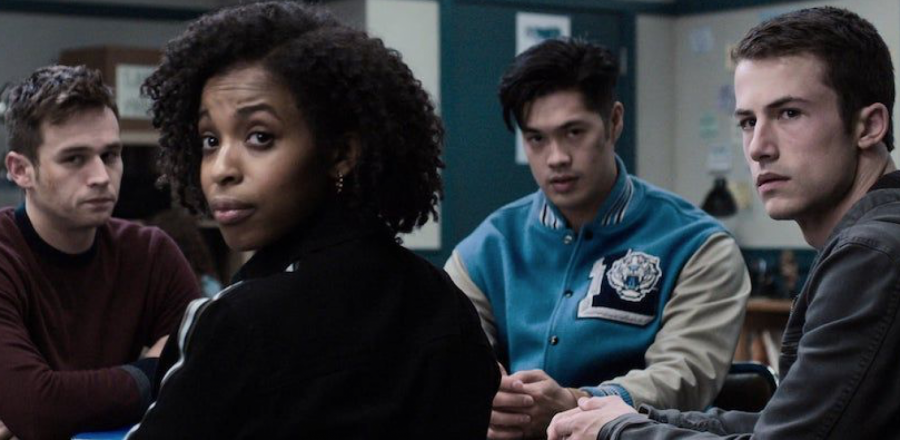13 reasons why “13 Reasons Why” season three could do better
How this show poorly represented high school culture by tackling aspects of various different social issues
September 4, 2019
*Trigger warning: this article contains mentions of rape, sexual assault and gun violence.
Netflix’s adaptation of Jay Asher’s book “Thirteen Reasons Why” released its third season of the show on Aug. 23. Within the 13 episodes of the season, the show primarily focuses on the death of serial rapist Bryce Walker, played by Justin Prentice, and the secrets that his peers are hiding. Although there are many positive features, the season overall lacked order.
Here are ways “13 Reasons Why” could be improved:
*Spoilers ahead
One – The unrealistic depiction of Tony’s family being deported
In episode 6, the show introduced the issue of deportation. Tony Padilla, played by Christian Lee Navarro, discovers that his family has been detained by ICE and is scheduled for deportation. Since deportation is such a prevalent issue in the country, it’s understandable that the show would want to highlight it. However, their portrayal of it is simply unrealistic as Tony’s family video calls him from Mexico, suddenly happy and united, glossing over the grim realities of deportation.
Two – The oversimplification of the #MeToo movement
Sexual assault has been a central theme since season one, and we’ve seen a number of characters struggle with the traumatic aftermath. This season, Jessica Davis, played by Alisha Boe, takes on the position as a leader and role model for those who are victims and survivors of sexual assault. Throughout the episodes, she gave speeches in front of her peers, and encouraged them to speak up and resist. Jessica’s words empowered other characters who experienced sexual assault almost too quickly. One speech and bam, suddenly everyone in the gym was rallying against rape culture. The show makes it seem like a simple, one-step solution when in reality, it isn’t. Jessica’s story was empowering, but a movement takes time and progress, not one speech.
Three – Monty’s LGBTQ+ storyline that had a lot of potential
In the first two seasons, Montgomery de la Cruz, played by Timothy Granaderos Jr., had always been that bully who just followed Bryce and nothing more. However, after he brutally sexually assaulted Tyler with a mop handle at the end of season two, it seemed like the show was planning on doing more with Monty’s character — and it did. As it turns out, Monty’s character was gay and closeted, living with his abusive and homophobic father. In episode five, Monty meets a boy at a party and the duo both feel an instant connection, leading up to them hooking up in a bedroom. After the party, Monty beats up the boy when he asks if they could see each other again. It’s clear that Monty had internalized the homophobia he experienced while living with his father, shedding a new perspective on his homophobic actions, which shows once again how even though his actions were inexcusable, the situation was not black and white. The most bothersome things were that Monty was wrongfully blamed (explained later) and died, leaving him without any chance to grow like Bryce and Tyler did.
Five – The irresponsible handling of guns by high schoolers
On multiple occasions, we see Liberty High students handling guns. The lack of any clear consequences faced by this, in a way said, “Hey. Let’s broadcast scenes where high schoolers are handling guns irresponsibly and not show examples of the correct way.”
Six – How Bryce’s storyline abruptly ended
Bryce Walker’s redemption arc was thought-provoking, as it initiated many different conversations. Some say that his character didn’t deserve a redemption arc whatsoever, while others claim it was fresh to see Bryce in a new light. While watching, I was conflicted between the Bryce that seemed to be learning and becoming more open-minded and Bryce that didn’t seem to change at all. One moment, he’s breaking down over the severity of what he did to his friends and the next, he’s breaking the leg of Zach Dempsey, played by Ross Butler, for developing a close friendship with his ex-girlfriend, Chloe. No matter how frustrating his character was, the show, without a doubt, did a brilliant job of showing how things aren’t just black and white. Through humanizing Bryce, it was clear that he was beginning to change, but he was still a long, long way from redemption. Unfortunately, his complex storyline was cut short by his death, wasting a lot of potential.
Seven – The disregard shown towards Tyler’s attempted school shooting
After his traumatic encounter with Monty, Tyler Down, played by Devin Druid, attempted to commit a school shooting during the last episode of season two, which was fortunately prevented by his friends. At the beginning of the season, Tyler was broken in many ways. However, by the end of the season, Tyler had bravely shared his narrative and was in a healthy place both mentally and physically. However, the show never fully addressed the consequences Tyler could face for almost shooting Liberty High. Despite the conflicts Tyler was enduring, nothing can excuse his attempt to kill. His friends’ care and effort should not be overlooked, but if the show truly wanted to spread awareness on finding and using resources, they should have promoted the importance of seeking professional help a lot more.
Eight – The introduction of the new girl, Ani
This season was narrated by the newly introduced character, Ani Achola, portrayed by Grace Saif, and it’s safe to say that this addition was unnecessary. Ani’s extremely nosy character seems almost out of place because even though she’s the new girl, she somehow knows everyone’s secrets. Like many other aspects of the show, her character was given a weak storyline and development.
Nine – How the two characters who were involved in Bryce’s death seemed almost irrelevant the entire show
Alex Standall, played by Miles Heizer, and Zach being directly involved in Bryce’s death was definitely unexpected, as both of their characters had the least amount of screen time this season compared to previous seasons and other characters. When the show finally revealed what happened to Bryce, I couldn’t make the connections. Sure, Bryce broke Zach’s knee. But is Zach really the type of person to get revenge by beating Bryce to a pulp? Not to mention that Alex’s reason for ultimately pushing Bryce into the water seems underwhelming and random. Zach and Alex’s characters this season do not properly reflect the two characters from past seasons, highlighting inconsistency within the show.
Ten – How everyone covered for Alex without any problems
Loyalty is an extremely important value in any friendship, which is why upon watching the last episode, it was understandable why everyone decided to cover for Alex to the police and use Monty as a scapegoat. But the more thought put into it, the more the audience would realize how disturbing the situation was. As enjoyable as Alex’s character was, he deserved to face the consequences of his actions. The show makes it seem like killing a person isn’t a big deal if the person was a terrible human being.
Eleven – Chloe’s abortion that the show avoided for the rest of the season
When Chloe Rice, played by Anne Winters, decided to get an abortion after finding out she was pregnant with Bryce’s baby, the audience saw a very brief glimpse of her emotions prior and during the procedure, and close to nothing afterward. If the show had delved deeper into her thoughts and continued Chloe’s storyline in later episodes, her development could’ve had a much stronger impact on viewers who could potentially relate to her character.
Twelve – How Clay literally turned into a different person
Ever since season one, Clay Jensen, portrayed by Dylan Minnette, has always been a rather sensitive character. He does whatever he can to protect the people he loves, but in season three, there is a drastic change in his behavior. Clay seems too angry in a lot in the episodes and snaps at his friends in almost every conversation, making his character almost unrecognizable from the first two seasons.
And finally, thirteen – The half-assed attempt at remembering Hannah Baker
The plot for “13 Reasons Why” ultimately stemmed from Hannah Baker’s suicide. While seasons one and two explored the ripple effect caused by her death, season three seemed to hover indefinitely between completely replacing her with Ani and bringing her memory back to clash with the new female lead. The show undoubtedly lost its connection to Hannah and her story, giving the impression that her story is over. It’s in the past. It’s not relevant anymore.
Despite the fact that the show failed to correctly depict every topic they tried to cover and wasted potential storylines, it did leave viewers thinking and feeling. If viewers can overlook plot inconsistency and love a good mystery, then I’d definitely recommend watching season three of 13 Reasons Why”. The actors and actresses did a phenomenal job, even with the occasional poor scripting or plot elements. “13 Reasons Why” has garnered such a big platform that they should be held responsible for what is being displayed to their viewers and the message that is being sent out.




























